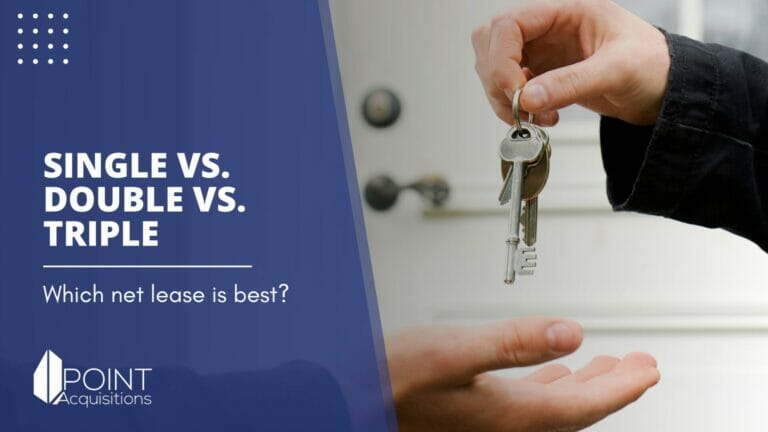
Single vs. Double vs. Triple: Which Net Lease Is Best?
The type of net lease you choose can profoundly impact your investment and management experiences in commercial real estate. Among the various lease structures available, single net lease, double net lease, and triple net lease stand out, each with specific advantages and obligations.
By comparing the details and distinctions of these net lease types, potential real estate investors and tenants can better determine which option aligns most closely with their financial goals and property management preferences.
This article sheds light on the complexities of these leases, helping you make a well-informed decision.

Table of Contents
What Are The Types of Net Leases?
Net leases have become popular in commercial real estate because they provide a more streamlined approach for tenants and property owners.
The term “net lease” originates from the concept that the landlord obtains a net amount after various costs, such as property taxes and insurance, are subtracted from the overall rent collected.
Net leases require that tenants cover these additional expenses on top of their monthly rent. Consequently, monthly rents in net leases typically trend lower than traditional leases, offering a financial incentive to tenants. The guiding principle here is straightforward: the more expenses a tenant shoulders, the more the base rent is reduced by the landlord.
When diving into net leases, there are three predominant forms to be familiar with. Different types of net leases are single net lease (N), double net lease (NN), and triple net lease (NNN). Each has unique responsibilities and benefits tailored to various tenant and landlord preferences.
Single Net Lease
The single net lease is often denoted as an “N” lease in commercial real estate and uniquely stipulates that tenants not only cover their monthly rent but also pay property taxes.
While this places the property tax burden on the tenant, the property owner must manage all other costs, including insurance, maintenance, repairs, and utilities.
It’s a significant point to note: if tenants fail to fulfill their tax obligations under this lease type, the property owner is held responsible. Many landlords integrate property taxes directly into the rent to mitigate potential tax-related complications.
Integrating property tax ensures timely and accurate tax payments, protecting both parties’ interests in the leasing relationship.
Double Net Lease
In commercial real estate, double net leases, or “NN” leases, represent a key leasing strategy many property owners and tenants employ. NN leases have found their niche in various properties, including shopping malls, office complexes, and industrial or warehouse spaces.
Tenants are responsible for paying their base rent, property taxes, and insurance premiums within a double net lease. These financial responsibilities shift the burden of certain operating expenses from the landlord to the tenant.
The property owner remains accountable for maintenance, repairs, and broader operating expenses despite these added tenant responsibilities.
The financial dynamics of double net leases can be enticing. Often, the rent in these leases is set lower than other lease types. However, once tenants account for taxes and insurance costs – usually apportioned based on their square footage – the overall expenditure can align closely with gross leases.
Landlords typically collect tax and insurance payments directly from tenants to ensure compliance and ease of payment. From an investment perspective, NN lease structure offers landlords the advantage of diminished operating expenses and a protective measure against potential spikes in tax or insurance rates.
Triple Net Lease
Triple net leases are a distinguished leasing option in commercial real estate. Often represented with the shorthand “NNN,” a triple net lease is frequently adopted for freestanding retail or office buildings and vast, single-tenant industrial properties.
Tenants assume responsibility for a comprehensive list of expenses: monthly rent, property taxes, property insurance, and nearly all maintenance, repairs, and building management – frequently categorized under CAM (Common Area Maintenance) costs.
The extensive financial risk transfer distinguishes a triple net lease from its double net counterparts. Essentially, NNN leases allocate almost every financial unpredictability from the landlord to the tenant. Potential financial unpredictability includes possible hikes in insurance premiums, fluctuating property tax rates, or unforeseen CAM expenditures.
Some property owners choose a bondable net lease to mitigate potential disruptions, especially lease terminations caused by unexpected costs. Bondable net leases secure tenants and inhibit alterations to the rent structure, offering stability.
While a triple net lease may place a hefty burden on tenants, there are still areas where landlords remain accountable. Major property enhancements and foundational structural repairs typically fall under the landlord’s purview.
For commercial real estate property owners, the appeal of a triple net lease is rooted in financial predictability. Even though the immediate rental income might appear subdued, the capability to more precisely forecast long-term profitability makes it a favored choice for many in the real estate industry.

What is an Example of a Net Lease?
Consider this practical scenario within the context of commercial real estate: An investor has possession of a commercial building currently leased out to a retailer.
Under the stipulations of their net lease, the tenant finds themselves accountable for an array of expenses beyond the simple rent. They are responsible for property taxes amounting to $1,200, property insurance premiums up to $500, and maintenance costs another $500. The various costs accumulate to a total of $2,200 in additional outlays. The monthly rent, priced at $2,800, brings the tenant’s monthly financial commitment to $5,000.
Beyond the sheer financial aspects, such a net lease provides the tenant notable advantages: they gain significant control over their expenses. Additionally, this leasing model allows them to adapt and modify the property in alignment with their operational necessities or preferences.
What Are the Pros and Cons of a Triple Net Lease
A triple net lease is easy to understand and manage for tenants and landlords. Tenants are responsible for all operating expenses, allowing the streamlining of management tasks. Despite the simplicity, the triple net lease has pros and cons.
Advantages of triple net leases
For both tenants and landlords, triple net leases offer a range of benefits:
For Tenants:
- Complete Control Over Property Maintenance and Upkeep: This advantage allows tenants to uphold their brand image and maintain the property to their specific standards, ensuring it aligns with their business needs.
- Direct Influence Over Variable Costs: Tenants can manage their expenses more effectively with a triple net lease. Expense management includes having control over utilities like electricity and water. Additionally, tenants can select their preferred insurance carrier and even challenge property taxes if they believe they have been overcharged.
For Landlords:
- Steady and Consistent Revenue: With most variable maintenance costs shifted to tenants, landlords can enjoy a more stable income stream, largely free from unexpected fluctuations that could arise from sudden repairs or tax hikes.
- Reduced Management Hassle: Since the tenant covers many ongoing expenses in a triple net lease, including utilities, repairs, property taxes, and property maintenance costs, landlords experience less administrative overhead. Instead, landlords can divert their attention and resources to their primary business ventures and other key operations.
Disadvantages of triple net leases
While triple net leases come with notable advantages, they also bring a set of challenges for both tenants and landlords:
For Tenants:
- Risk of Property Tax Increases and Fluctuating Insurance Costs: As tenants are responsible for triple net lease payments, any increase in property taxes or unexpected hikes in insurance rates will directly impact their expenses.
- Potential for Overpayment: If the landlord incorrectly estimates the operating costs and sets the rental price too high, tenants may pay more than necessary.
- Time and Effort Required for Property Management: Tenants must allocate resources to hire repair services, manage insurance, and oversee day-to-day operating expenses.
- Possibility of Unexpected Costs: In a triple net lease, unexpected events such as sudden maintenance needs or unexpected tax assessments, can strain the tenant’s budget, given their responsibility for these costs.
For Landlords:
- Difficulty in Finding Reliable Tenants: Only some businesses can take on the responsibilities of a triple net lease, leading to potentially longer vacancies and downtime between tenants.
- Need to Consider Tenant Credit Risk: With tenants responsible for a wide range of expenses, their financial stability becomes even more critical. Landlords must vet potential tenants rigorously to ensure they can cover both the rent and the associated operating expenses.

Why Do National Companies Choose Triple Net Leases over Double Net?
Large multinational companies place a premium on brand uniformity and coherence across their various outlets. For this reason, they frequently opt for triple net leases—especially over extended durations, often spanning up to 25 years.
Corporations assume comprehensive financial and physical responsibilities by entering into a triple net lease. Responsibilities include everything from property maintenance and vendor selection to signage and covering the full range of operating expenses.
Such companies are not just tenants but pillars of reliability in commercial real estate. The company’s stature and commitment to upkeep make them a preferred choice, often considered conservative investments for real estate investors.
Conclusively, net leases, particularly triple net leases, offer a symbiotic relationship, providing tenants and landlords with commercial real estate advantages designed for their specific needs and business objectives.
About The Author

Jesse Shemesh
Disclaimer
Please note that Point Acquisitions is not a tax expert or tax advisor. The information on our blogs and pages is for general informational purposes only and should not be relied upon as legal, tax, or accounting advice. Any information provided does not constitute professional advice or create an attorney-client or any other professional relationship. We recommend that you consult with your tax advisor or seek professional advice before making any decisions based on the information provided on our blogs and pages. Point Acquisitions is not responsible for any actions taken based on the information provided on our blogs and pages.
1031 Exchange Capital Gains Tax Deferral
According to a 2021 report by the National Real Estate Exchange Services (RES), over 240,000 1031 exchange transactions were completed in the United States, totaling $100 billion. This impressive figure underscores the role of 1031 exchanges in the real estate…
Read More1031 Exchange Benefits
As of Q4 2023, the national vacancy rate for all commercial property types in the United States sat at 9.2%, according to CBRE’s latest insights and research. This represents a slight decrease compared to the previous quarter and suggests a…
Read More1031 Exchange Legal Considerations: A Must-Read Guide
You’re in the right place if you’re considering a 1031 exchange for your commercial real estate investments. Whether you’re a seasoned investor or just dipping your toes into the market, understanding the legal landscape of 1031 exchanges is key to…
Read More

